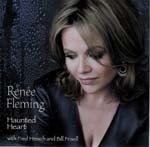This is not a classical CD. Neither is it “classical star belts out pop and show tunes in her operatic voice.” This is a jazz vocal album, and a very subtle and introspective one. In her liner notes, Renée Fleming calls the sound she uses here her “other voice”. You might even call it her “original voice”, since her first real musical job was as a jazz club singer. Singing as she often does here–right on top of the microphone–a pointed, fully supported sound would have been disastrous, as indeed, such an approach frequently has been for classical vocalists attempting American popular repertoire. This rather breathy throat voice, however, is perfect for capturing the style, mood, and character of these songs.
Fleming may have left her operatic voice behind, but not the lessons that have made her a classical music star. Her phrasing is exemplary, and her mastery of breath control allows her to extend lines to daring lengths. Her exceptional technical knowledge allows her to register emotions with shifts in color that are sometimes sudden, but more often are achieved with a minimal but telling change. Daringly keeping the whole program in slowish tempos and introspective mood, Fleming succeeds through her mastery of nuance, an artistry shared by her excellent session partners, pianist Fred Hersch and guitarist Bill Frisell.
The overall theme of this program of mostly less-familiar songs ranges from the devastation of lost love (Arthur Schwartz’s “Haunted Heart”; Joni Mitchell’s “River”; Carl Fischer’s “You’ve Changed”) to less painful reminiscence about love; but there is always a sense that love is more a reality or an ideal than something achieved, even in songs that are usually upbeat, such as Stevie Wonder’s “My Cherie Amour”, Lennon & McCartney’s “In My Life”, and even Harry Warren’s “This Is Always”.
In an astonishing sequence, Jimmy Webb’s very dark “The Moon’s a Harsh Mistress” is followed by a piano interlude that quotes the descending chords following Wozzeck’s drowning in Alban Berg’s opera. Hersch extends this into an improvisation leading seamlessly into the Johnny Mercer standard “Midnight Sun”. This is the “haunted heart” of the disc, and at this point it rises to real greatness. As the mood lightens toward the end, Mahler’s “Liebst du um Schönheit” and Villa-Lobos’ “Canção do Amor” are sung as jazz songs (successfully), and Emile Paladilhe’s “Psyché”, though sung as written, is still in “jazz voice”, working well that way.
This is among the best jazz/pop albums ever attempted by an operatic diva, the best since Eileen Farrell’s “I’ve got a Right to Sing the Blues” of the 1950s. It would be too much to expect the performances to match the great work of Sarah Vaughan and her peers, but Fleming’s work is worthy of the comparison and I suggest that it would please jazz fans. Sound-wise, I did note an unusual hollow quality in the lowest, quietest, most closely sung notes. Otherwise, the recording has a warm studio sound with an ambience that befits the intimate mood.
































